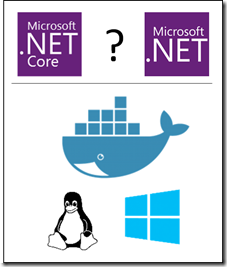The short answer is: “For Docker containers, use .NET Core whenever is possible”. But, below is a summary decision table depending on your architecture or application type and the server operating system you are targeting for your Docker containers.
Take into account that if you are targeting Linux containers you will need Linux based Docker hosts (VMs or Servers) and in a similar way, if you are targeting Windows containers you will need Windows Server based Docker hosts (VMs or Servers).
| Architecture / App Type | Linux containers | Windows containers |
| Microservices | .NET Core | .NET Core |
| Monolithic deployment App | .NET Core | .NET Framework
.NET Core |
| Best-in-class performance and scalability | .NET Core | .NET Core |
| Windows Server “brown-field” migration to containers | — | .NET Framework |
| Containers “green-field” | .NET Core | .NET Core |
| ASP.NET Core | .NET Core | .NET Core recommended
.NET Framework is possible |
| ASP.NET 4 (MVC 5, Web API 2) | — | .NET Framework |
| SignalR services | .NET Core in upcoming releases | .NET Framework
.NET Core in upcoming releases |
| WCF, WF and other traditional frameworks | — | .NET Framework |
| Consumption of Azure services | .NET Core
(Eventually all Azure services will provide Client SDKs for .NET Core) |
.NET Framework
.NET Core (Eventually all Azure services will provide Client SDKs for .NET Core) |
And here’s a written summary about it:
You should use .NET Core for your containerized Docker server application when: • You have cross-platform needs. You want to use Linux containers and Windows containers. • Your application architecture is based on microservices. • You need best-in-class high performance and hyper-scale.
You should use .NET Framework for your containerized Docker server application when: • Your application currently uses .NET Framework and has strong dependencies on Windows • You need to use third-party .NET libraries or NuGet packages not available for .NET Core. • You need to use .NET technologies that are not available for .NET Core. • You need to use a platform that doesn’t support .NET Core.
I’m writing further details about this subject in a separate and longer document, but I thought it would be good to share this summary table with the community and get some feedback. Please, post your feedback here in the blog post or send me direct feedback to cesardl at microsoft.com


0 comments